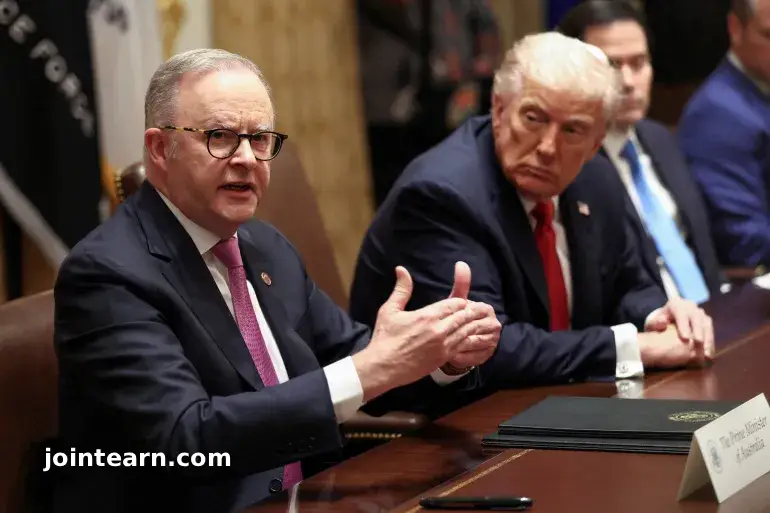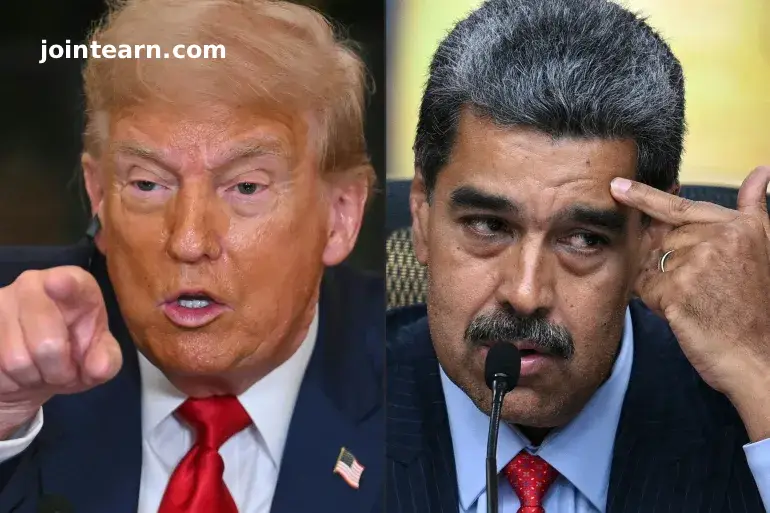
Washington, D.C. — October 20, 2025.
In a major step toward securing critical mineral supplies, US President Donald Trump and Australian Prime Minister Anthony Albanese have signed a sweeping agreement to jointly develop and process rare earth elements and strategic minerals — a direct response to China’s tightening grip over global supply chains.
The two leaders finalized the deal on Monday at the White House, marking a new phase of economic and defense cooperation between Washington and Canberra. The agreement aims to strengthen the West’s access to critical resources essential for electric vehicles, renewable energy technologies, and military equipment.
A Strategic Pact Against China’s Rare Earth Monopoly
Under the new framework, valued at $8.5 billion, both the United States and Australia will invest $1 billion each over the next six months into joint mining, refining, and processing projects. The deal also establishes a price floor for critical minerals, a long-sought measure by Western miners to reduce vulnerability to Chinese price manipulation.
Trump said the accord had been in the works for four to five months, describing it as a “historic step” toward energy independence and industrial security.
“This partnership ensures that no nation can use rare earths as leverage against the United States or our allies,” Trump said during the signing ceremony. “We are securing the supply chains that power our future.”
Prime Minister Albanese hailed the deal as an investment in both nations’ long-term security and prosperity.
“We have an $8.5 billion pipeline ready to go,” he told reporters. “This will boost jobs, energy transition projects, and national resilience.”
Strengthening AUKUS and Expanding Defense Ties
The rare earth agreement builds upon existing cooperation under the AUKUS security pact, the trilateral partnership between the United States, Australia, and the United Kingdom. Beyond minerals, both leaders are expected to discuss nuclear-powered submarines, military technology transfers, and supply chain resilience.
The meeting also revisited the $239.4 billion submarine deal signed in 2023 under then-President Joe Biden. Under that agreement, Australia is set to purchase US-made Virginia-class submarines by 2032, before co-developing a next-generation submarine class with Britain.
US Navy Secretary John Phelan said Washington and Canberra were “working closely to clarify and strengthen” the framework of the earlier AUKUS agreement. Trump dismissed lingering concerns, stating, “There shouldn’t be any more clarifications — we’re going full steam ahead.”
Australia’s Defence Minister Richard Marles reaffirmed confidence that the submarine program would proceed on schedule, adding that Canberra has already contributed $2 billion this year to expand US submarine production and is preparing to maintain Virginia-class vessels at its Indian Ocean base by 2027.
Australia’s Rare Earth Leverage and China’s Tightening Controls
The United States and its allies have grown increasingly alarmed by Beijing’s expanding export controls on rare earths — minerals crucial to the global technology and defense sectors. China remains the world’s top producer, accounting for about 70 percent of rare earth mining and 90 percent of processing capacity.
In early October, China announced new export restrictions requiring licenses for shipments of rare earth magnets and materials derived from Chinese technology. The move, viewed as a strategic pressure tactic, has intensified efforts among Western nations to develop alternative sources.
“Australia’s vast mineral wealth is becoming a strategic asset,” said a Canberra-based trade official. “By partnering with the US, we can ensure that China doesn’t dictate the pace of the global green transition.”
Australia, which holds one of the largest rare earth reserves after China, is positioning itself as a reliable supplier for allied nations. Officials confirmed that Canberra is prepared to sell shares in its strategic reserves of critical minerals to trusted partners, including the United States and the United Kingdom.
Building Economic and Industrial Resilience
The newly signed agreement reflects the growing importance of critical minerals in global geopolitics. Rare earths are vital components in electric vehicles, wind turbines, smartphones, radar systems, and advanced weaponry — industries that have become focal points of the US-China strategic rivalry.
By establishing a joint investment pipeline, Washington and Canberra seek to enhance Western control over critical supply chains while fostering economic growth and energy independence. The inclusion of a price stabilization mechanism is also expected to attract more private investment into rare earth mining and processing.
The partnership aligns with broader US efforts to “friend-shore” key industries, ensuring that vital resources come from allied nations rather than geopolitical competitors.
A Unified Front in a Shifting Global Landscape
The Trump–Albanese meeting comes after months of diplomatic anticipation, marking the first official bilateral summit since Trump took office earlier this year. The delay had caused unease in Canberra, with concerns about the future of AUKUS and defense cooperation.
However, Monday’s agreement signals renewed alignment between the two allies. Trump emphasized that both countries are “moving forward together to ensure economic security and military strength in the Indo-Pacific.”
Top US officials, meanwhile, denounced China’s recent export restrictions as a “direct threat to global supply chains” and vowed continued coordination with allies to protect access to critical resources.
As the world transitions toward clean energy and advanced manufacturing, the race to secure rare earths is fast becoming a defining feature of 21st-century geopolitics — and the US-Australia alliance now stands at the center of that contest.


Leave a Reply